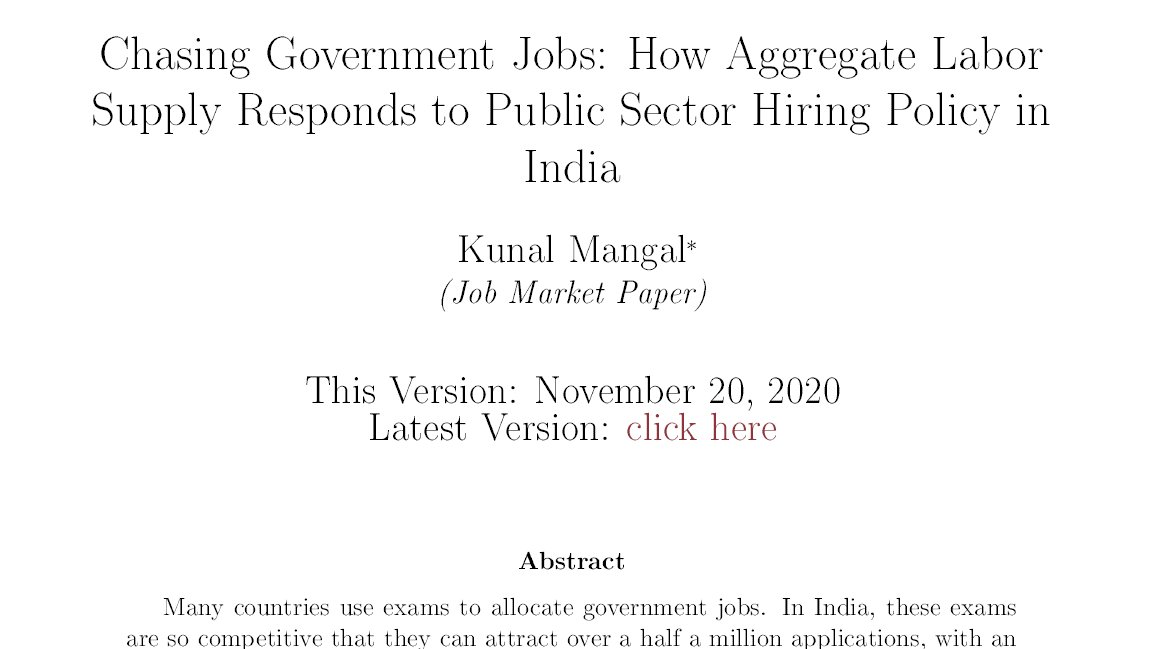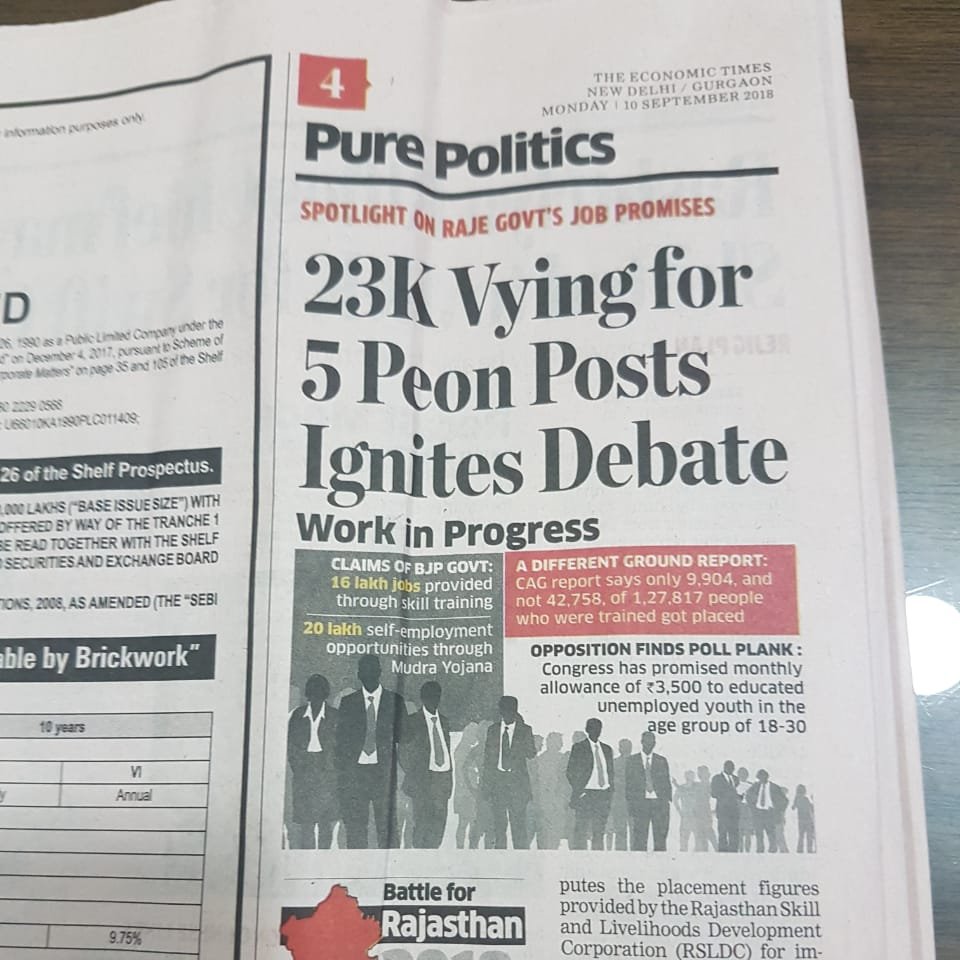Hi #EconTwitter! I am a @Kennedy_School PhD student on the #econjobmarket. I study labor markets in developing countries - especially in India.
Here& #39;s a thread on my JMP:
https://scholar.harvard.edu/files/kmangal/files/jmp.pdf
1/n">https://scholar.harvard.edu/files/kma...
Here& #39;s a thread on my JMP:
https://scholar.harvard.edu/files/kmangal/files/jmp.pdf
1/n">https://scholar.harvard.edu/files/kma...
Open up a newspaper in India and you& #39;ll likely see a headline about how competition for govt jobs is out of control.
For the past three years I& #39;ve been trying to understand:
Should we worry that there& #39;s so much competition for these posts? If so, what can be done?
2/n
For the past three years I& #39;ve been trying to understand:
Should we worry that there& #39;s so much competition for these posts? If so, what can be done?
2/n
For most households in India, govt jobs are the foundation on which all dreams of a good life rest. These jobs come with high wages + lifetime tenure + social status. So it& #39;s not surprising that they attract long queues.
3/n [h/t @siddyg88 for this video]
3/n [h/t @siddyg88 for this video]
In India, as in many countries, allocation for govt jobs is determined by an exam.
So candidates can spend years of their life (especially early 20s) unemployed, studying full time.
[Photo shows aspirants at a coaching center in Patna, Bihar]
4/n
So candidates can spend years of their life (especially early 20s) unemployed, studying full time.
[Photo shows aspirants at a coaching center in Patna, Bihar]
4/n
My JMP - https://scholar.harvard.edu/kmangal/files/jmp.pdf">https://scholar.harvard.edu/kmangal/f... - provides the first evidence (to my knowledge) that the availability of govt jobs *causes* unemployment.
I study how the labor market responded when Tamil Nadu froze most admin hiring between 2001-2006. [What do you think will happen?] 5/n
I study how the labor market responded when Tamil Nadu froze most admin hiring between 2001-2006. [What do you think will happen?] 5/n
I estimate impact using a diff-in-diff design, comparing across states and cohorts. Main treatment group: men who were expected to graduate from college during the hiring freeze, since they would& #39;ve been most likely to apply during normal times, and hence most affected. 6/n
The # of posts lost due to the freeze was small relative to the labor market. For most affected cohorts, ~ 0.3% would have been hired it not for freeze. But diff-in-diff indicates that unemp *increased* by ~ 6pp (30%) among most affected cohorts of male college graduates! 7/n
This was a surprise to me + advisors. We were expecting to see unemployment fall b/c candidates gave up studying and started working.
But we forgot: the freeze makes the remaining posts more competitive, so candidates can also choose to double down and study more.
8/n
But we forgot: the freeze makes the remaining posts more competitive, so candidates can also choose to double down and study more.
8/n
Sure enough, we see that application rates skyrocket during the hiring freeze, consistent with more studying. [Y axis in logs]
9/n
9/n
Why might this happen? I argue this is more likely to happen when the returns to exam preparation are convex. And I provide some evidence that this is the case using a novel IV strategy (based on item response theory) and new administrative data.
10/n
10/n
Furthermore - the hiring freeze appears to have had long run consequences: the same cohorts that were more unemployed also have lower earnings about a decade after the hiring freeze ended.
No evidence, then, that the extra time studying built human capital.
11/n
No evidence, then, that the extra time studying built human capital.
11/n
What does this mean?
1. Hiring policy provides levers that can move the labor market, perhaps not dissimilar to how central bank policy moves credit markets. We should learn more about what these levers do!
2. Supply side important driver of unemployment here
12/n
1. Hiring policy provides levers that can move the labor market, perhaps not dissimilar to how central bank policy moves credit markets. We should learn more about what these levers do!
2. Supply side important driver of unemployment here
12/n
3. The logic of cutting losses vs. doubling down generalizes. It shows up when blue collar men confront a declining manufacturing sector in the US, or when job mkt candidates confront the COVID shock. This case study teaches us about how people make that tradeoff. 13/n
4. The mechanism tells us that unemp is not an inevitable consequence of high govt compensation. The selection mechanism matters.
If we de-convexify the returns to exam prep (e.g. randomly select among candidates with score > X), then we may not see the same response.
14/n
If we de-convexify the returns to exam prep (e.g. randomly select among candidates with score > X), then we may not see the same response.
14/n
5. India-specific: delays and de facto freezes in civil services exams are becoming commonplace, as @ravishndtv& #39;s program consistently highlights.
My findings suggest that these delays may have contributed to the record-level unemployment we saw in India pre-COVID.
15/n
My findings suggest that these delays may have contributed to the record-level unemployment we saw in India pre-COVID.
15/n
For me, this paper is just the beginning of a longer-term agenda on competitive exams.
In the pipeline: whether it& #39;s rational to apply, how gender norms may disadvantage women in the process, and more.
(As well as ideas on other topics!)
(n-1)/n
In the pipeline: whether it& #39;s rational to apply, how gender norms may disadvantage women in the process, and more.
(As well as ideas on other topics!)
(n-1)/n
If you& #39;re intrigued, you can read more about the paper and my research plans on the "Research" tab of my website: https://scholar.harvard.edu/kmangal
Looking">https://scholar.harvard.edu/kmangal&q... forward to sharing + discussing with the community in the coming months.
n/n
Looking">https://scholar.harvard.edu/kmangal&q... forward to sharing + discussing with the community in the coming months.
n/n

 Read on Twitter
Read on Twitter

![In India, as in many countries, allocation for govt jobs is determined by an exam. So candidates can spend years of their life (especially early 20s) unemployed, studying full time.[Photo shows aspirants at a coaching center in Patna, Bihar]4/n In India, as in many countries, allocation for govt jobs is determined by an exam. So candidates can spend years of their life (especially early 20s) unemployed, studying full time.[Photo shows aspirants at a coaching center in Patna, Bihar]4/n](https://pbs.twimg.com/media/EnrJvj-XYAEAjiB.jpg)

![Sure enough, we see that application rates skyrocket during the hiring freeze, consistent with more studying. [Y axis in logs]9/n Sure enough, we see that application rates skyrocket during the hiring freeze, consistent with more studying. [Y axis in logs]9/n](https://pbs.twimg.com/media/EnrY0AKW4AIEMDX.jpg)


